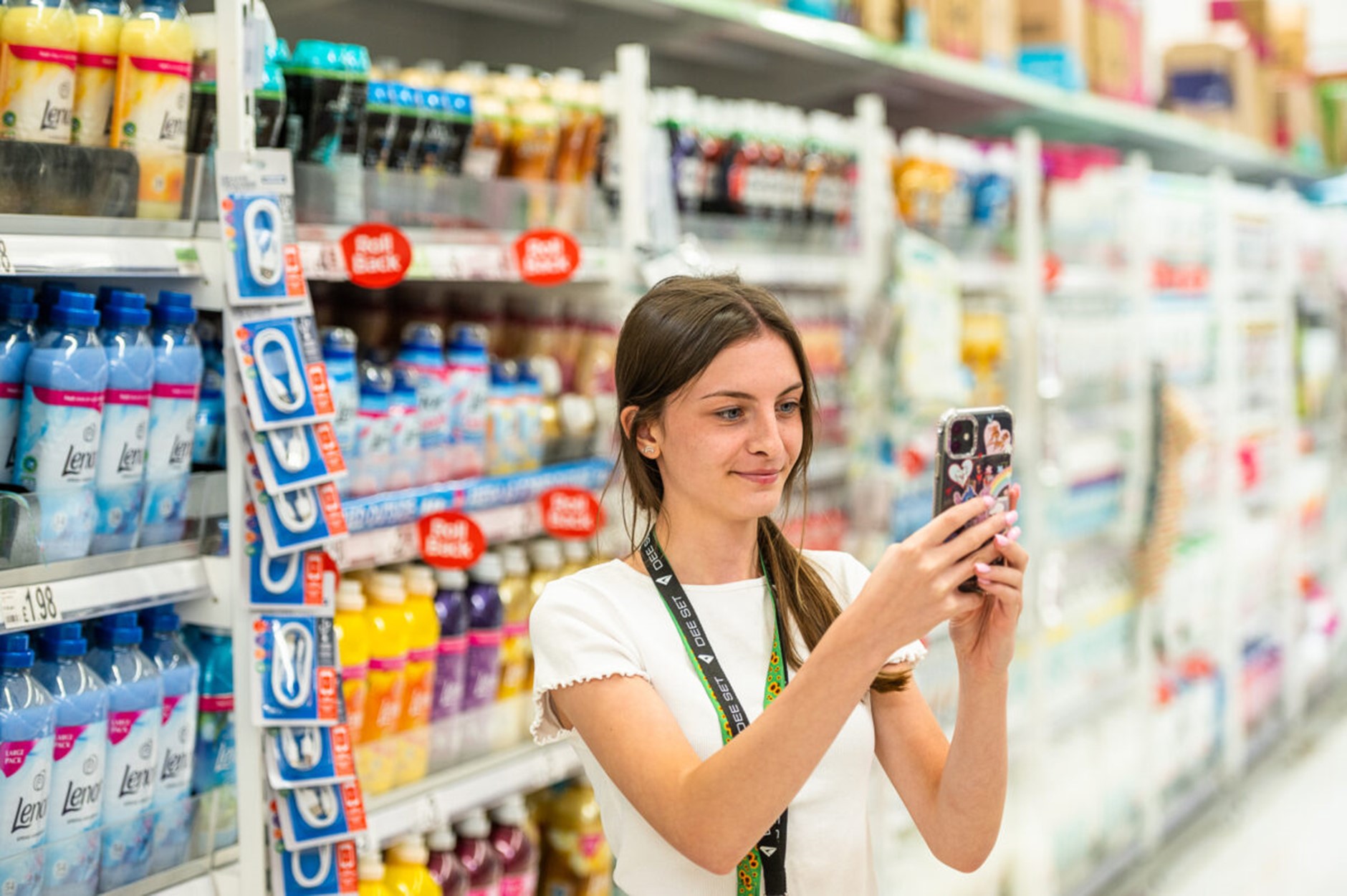More so than ever, it seems as though businesses are catching onto the rise of the conscious consumer. It’s crucial they understand the importance of not just telling their customers that they care about their impact on the world, but prove it too. In an era where environmental concerns are paramount, it’s clear that many businesses are currently facing an increasing pressure to adopt sustainable and responsible practices. The push towards sustainability isn’t just a trend; it’s a necessity driven by consumer demand, regulatory requirements, and the urgent need to address climate change.
Our field team partner, Tactical Solutions, is a proud B Corp-certified business. This means that alongside supporting our clients with their sustainability missions, we’re also on our own journey too! We strive to create sustainable plans across all areas of the business to thrive.
Behind the scenes, we take on many initiatives to make us a responsible and more sustainable company, but more on that later…
The Round-Up recently discovered that a massive 84% of customers say that poor environmental practices will alienate them from a brand or company. Ultimately, businesses need to align with their customer’s needs – if they appear to be failing in this area, they may face the risk of losing out to similar competitors who appear to be more socially conscious, or rivals who are cracking down on their impact on the planet. Down the line, this could have a detrimental impact on a business’s sales and profit.
But all is not lost…
There is one tried and trusted measure that businesses can adopt to give them a great starting point when it comes to improving their sustainability practices…
Leveraging data can actually significantly enhance a retailer’s sustainability efforts by transforming eco-friendly initiatives with good intentions into impactful actions. With Deloitte recently reporting that 37% of shoppers consider how biodiverse the purchase will be, it’s clear that it’s time for businesses to take action to embrace this new wave of consumers.
In this blog, we’ll explore how data fuelled by analytics drives sustainability in retail, providing insights and actionable strategies for creating a greener future and adopting more eco-conscious strategies.
The Eco-Friendly Dilemma: How Does Data Drive Sustainability in Retail?
We do have a bit of sympathy for businesses – constantly facing expectations to meet and deliver new processes and innovations in response to consumer and cultural shifts is truly a challenge! It’s clear that many businesses are now at a crossroads where they must balance the line between maintaining profitability and delivering environmental responsibility. Both approaches are important and both require a significant amount of investment.
That’s where data comes in as a useful tool – it plays a pivotal role in resolving this eco-friendly dilemma, offering a wealth of information to encourage businesses to drive sustainable decision-making.
It was reported by Cap Gemini that almost 80% of retailers believe that their sustainability work increases customer loyalty. Data can help brands and retailers understand consumer preferences, learn how to optimise their supply chains and help them gain better insight on the future demand of products.
It’s clear that data analytics are the key to unlocking a more sustainable retail sector – let’s explore why…
Work Out the Principles Your Shoppers Value
With 89% of global consumers changing their shopping habits to be more eco-friendly, it’s evident that today’s consumers are more informed and conscientious about their purchases than ever before.
They seek out brands that align with their values, particularly concerning their environmental impact. By harnessing data analytics, retailers can gain deep insights into what their shoppers prioritise, which means they can better inform their future strategies. To gain this valuable insight, businesses may conduct surveys, monitor social media interactions, purchase history and seek feedback to provide valuable data points.
Analysing this data helps businesses to:
- Identify key trends in consumer preferences for sustainable products or practices.
- Customise marketing strategies to highlight eco-friendly practices.
- Develop products that meet the ethical standards of their target audience.
- Identify and mitigate risks in their current strategies.
Additionally, data will also provide insights for businesses to help mitigate their waste through optimised ordering and stocking. For instance, if data reveals a growing interest in consumer purchase for organic products, retailers can adjust their inventory and marketing efforts to cater to this demand, enhancing customer satisfaction and loyalty.
It’s worth noting though that shoppers will commonly rely on businesses to make sustainable choices for them. Although many are concerned with the impact they are having on the environment, Marketing Week recently reported that shoppers prefer convenience. This suggests that businesses need to make their sustainable practices accessible to gain favour from their consumers.
Take Note of Changing Market Trends and Competitor Activity
The act of staying ahead in the competitive retail landscape requires constant vigilance for businesses. Data analytics enables businesses to monitor retail market trends and competitor activities, ensuring they remain at the forefront of sustainability efforts.
Key strategies include:
- Analysing sales data to identify which sustainable products are gaining traction.
- Monitoring competitor initiatives and benchmarking performance.
- Using predictive analytics to forecast future trends and adapt strategies accordingly.
By keeping a close eye on the market, businesses can proactively respond to changes in quick time and implement new measures. An example of this could be something like a surge in demand for plastic-free packaging or the popularity of ethical sourcing practices.
This proactive approach ensures that retailers not only meet, but exceed consumer sustainability expectations.
Gain Insights into the Carbon Footprint of Your Brand
As a proud carbon neutral company (accredited by ClimatePartner), we understand the value in reducing our carbon footprint when it comes to the impact we have on the planet.
This is particularly important due to the fact the retail sector is one of the top 10 most carbon-intensive industries, responsible for roughly 25% of global greenhouse gases. Data analytics can provide businesses with the tools to measure and manage this impact accurately. By analysing data from various sources, businesses can:
- Track energy consumption across stores and distribution centres.
- Assess the environmental impact of their supply chain, from production to delivery.
- Identify areas where carbon emissions can be reduced, such as optimising transportation routes or enhancing energy efficiency in stores.
These insights can be used to set measurable sustainability goals, such as achieving carbon neutrality or reducing emissions by a certain percentage. Communicating these goals and progress to consumers shows transparency, which strengthens brand reputation and trust.
Supporting this, Statista reported that 60% of consumers stated they believed that trustworthiness and transparency were the most important traits of a business, dominating all other traits.
Sustainability in Action: The Reapp Story

Here at Reapp, we leverage the use of data technology to bring retail insights to the businesses we work with. Using our dynamic products and software, we deliver searing clarity and razor-sharp, predictive insights to ensure success for our customers. We understand the increasing pressure to adopt greener practices, and thanks to our Insight, Spotlight and Vision platforms, we give our clients the power to use data analytics to transform their operations. Let’s explore how:
- Reapp Insight: Our Insight platform is a great tool that helps businesses make data-driven decisions. Using Spotlight (Insight for mobile) , field teams can navigate and load insights in-store, directly at the shelf edge using a tablet or mobile. Stay alert to what is happening in the store through the use of helpful automated alerts which report on key performance indicators such as sales, availability, and underperforming products. Spotlight also enables users to assign underperforming stores to field team members to ensure interventions can be made.
- Reapp Vision: This platform is our AI-Driven Image Recognition tool, which analyses in-store images for promotion compliance, display standards and can even measure the share of shelf space. This advanced technology ensures that every product is placed correctly according to planogram requirements and promotional guidelines. It can also contend with Reapp Insight, this integration ensures that all visual data is aligned with broader business insights, offering a holistic view of in-store performance.
If you’re a business looking to drive sustainable practices, our data-centric approach will help you to take the next, informed steps. Whether you’re reviewing your supply chain, seeking to uncover consumer shifts or you want to understand product performance at the shelf edge, we have you covered…
Get in touch today to find out more!
Transform Your Ethos with Data Analytics
The path to sustainability in retail is paved with data. By leveraging innovative data analytics, businesses can gain a comprehensive understanding of consumer values, market trends, and their own environmental impact.
Data insights provide the power to assist businesses in making informed decisions that align with both business goals and sustainability objectives. Adopting a data-centric approach that includes retail analytics will also help to enhance customer satisfaction and brand loyalty. Retailers that embrace data analytics as a basis of their sustainability efforts will not only be pioneers in the industry (helping to pave the way for new and sustainable innovations), but they will also be helping to change the way sustainability is viewed and practised in the industry.
It’s time to take the next steps and embrace the power of data to transform your retail ethos to meet the demands of a sustainable world.
Let us give you the tools you need to really make an impact. Get in touch with our friendly team today to book a demo or find out more about how Reapp can help your business.
